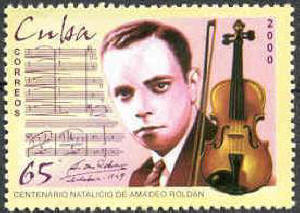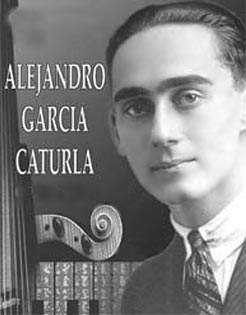Amadeo Roldán
Amadeo Roldán y Gardes ( born July 12, 1900 in Paris, † March 7, 1939 in Havana ) was a Cuban composer and violinist.
Roldán studied to 1916 music theory and violin at the Conservatory of Madrid and took private lessons in composition with Conrado el Campo. In 1919 he went to Havana, where he was conductor and student of Pedro Sanjuán. In 1932 he became conductor of the Orquesta Sinfónica de La Habana. In 1927 he founded the Havana String Quartet, 1931, the Escuela National de musica. In addition, he taught harmony and composition at the Conservatorio Municipal de La Habana, its director in 1936, he also organized the Conciertos de Música Nueva.
Roldán is considered one of the most important Cuban composers of the 1920s and 1930s and the main representative of the Afrocubanismo, a style of music which combined rhythm and instrumentation of African and Cuban music with the Western European music tradition. His most famous work was the ballet La Rebambaramba to a libretto by Alejo Carpentier, which was performed in Berlin, Budapest, Los Angeles, Mexico and Bogota with great success.
Works
- 3 Pequeñas poemas for orchestra, 1926
- A Chango for four guitars, 1928
- Canciones populares 2 for Cello and Piano, 1928
- Danza negra for vocals, two clarinets, two violas and drums,
- La remabaramba, Ballet, 1928
- El milagro de Anaquillé, Ballet, 1929
- Llamada para despertar a Papa Montero for clarinet, two violins, two violas and timpani
- Rítmica, no one for woodwinds and piano, 1930
- Rítmica, no 5; Tiempo de son for percussion ensemble, 1930
- Rítmica, no 6 Tiempo de rhumba for percussion ensemble, 1930
- Motivos de son for high voice and orchestra, 1934
- 2 Piezas infantiles for piano, 1937
- Poema negra, string quartet, 1939



.jpg)
.jpg)





